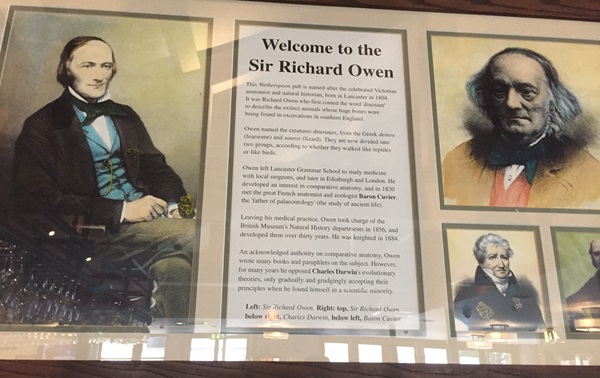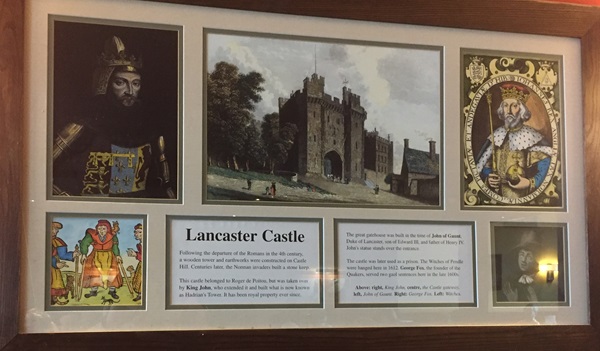4 Spring Garden Street, Lancaster, Lancashire, LA1 1RQ
This pub is named after the anatomist who was born in Lancaster in 1804 and coined the word ‘dinosaur’.
Prints and text about The Sir Richard Owen.

The text reads: This Wetherspoon pub is named after the celebrated Victorian anatomist and natural historian, born in Lancaster in 1804. It was Richard Owen who first coined the word ‘dinosaur’ to describe the extinct animals whose huge bones were being found in excavations in southern England.
Owen named the creatures dinosaurs, from the Greek deinos (fearsome) and sauros (lizard). They are now divided into two groups, according to whether they walked like reptiles or like birds.
Owen left Lancaster Grammar School to study medicine with local surgeons, and later in Edinburgh and London. He developed an interest in comparative anatomy, and in 1830 met the great French anatomist and zoologist Baron Cuvier, the father of palaeontology (the study of ancient life).
Leaving his medical practice, Owen took charge of the British Museum’s Natural History departments in 1856, and developed them over thirty years. He was knighted in 1884.
An acknowledged authority on comparative anatomy, Owen wrote many books and pamphlets on the subject. However, for many years he opposed Charles Darwin’s evolutionary theories, only gradually and grudgingly accepting their principles when he found himself in a scientific minority.
Left: Sir Richard Owen
Right: top, Sir Richard Owen, below right, Charles Darwin, below left, Baron Cuvier.
Prints and text about Lancaster Castle.

The text reads: Following the departure of the Romans in the 4th century, a wooden tower and earthworks were constructed on Castle Hill. Centuries later, the Norman invaders built a stone keep.
This castle belonged to Roger de Poitou, but was taken over by King John, who extended it and built what is now known as Hadrian’s Tower. It has been royal property ever since.
The great gatehouse was built in the time of John of Gaunt, Duke of Lancaster, son of Edward III, and father of Henry IV, John’s statue stands over the entrance.
The castle was later used as a prison. The Witches of Pendle were hanged here in 1612. George Fox, the founder of the Quakers, served two gaol sentences here in the late 1600s.
Above: right, King John, centre, the castle gateway, left, John of Gaunt
Right: George Fox
Left: Witches.
If you have information on the history of this pub, then we’d like you to share it with us. Please e-mail all information to: pubhistories@jdwetherspoon.co.uk